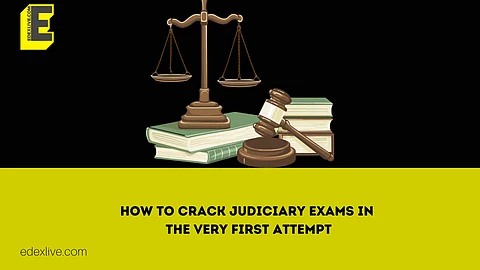

Driven by the pursuit of justice and the promise of impact, aspiring judges across India prepare with determination for one of the most competitive exams in the legal domain: the judiciary exams.
For many aspirants, this highly competitive exam is the gateway to a prestigious and fulfilling career in law. Securing success on the first attempt is a steep challenge, with over 50,000 aspirants competing for a limited number of seats each year. Yet, with a clear strategy and disciplined execution, it is entirely achievable.
A clear grasp of the exam pattern and syllabus is the first strategic move every aspirant must make. The first step is to familiarise yourself with the structure of the judicial services exam in your respective state.
Most judiciary exams are conducted in three stages: Preliminary, Mains, and Interview. While the Prelims test your basic legal aptitude and general awareness, the Mains demand in-depth understanding and articulation. The Interview assesses your personality, legal reasoning, and ethical judgment.
Study the syllabus in detail and mark important topics. Laws like the Indian Penal Code, Civil Procedure Code, Criminal Procedure Code, Indian Evidence Act, Constitution of India, and Contract Act form the backbone of the exam. Equally important are local/state laws.
Judiciary preparation is a long-term commitment. Ideally, you should begin your preparation at least a year in advance. It is easy to get overwhelmed with the vast syllabus, but staying organised is crucial.
Create a month-wise, week-wise, and day-wise schedule that covers the entire syllabus. Allocate more time to complex subjects and include regular revisions.
Break your study sessions into manageable chunks with short breaks in between to avoid fatigue. Use weekends for full-length mock tests or in-depth revisions. Flexibility is important, but consistency is critical.
Rote memorisation will not help in judiciary exams. You must understand the why and how of legal provisions. Spend time analysing case laws and their applications. Refer to the bare acts frequently — they are your best friend. Supplement them with standard commentaries and textbooks only when needed.
For essay-based questions in Mains, clarity and structure are crucial. Practice answer writing regularly, and get your answers evaluated by mentors or peers.
While legal aptitude is your core, general knowledge and current affairs — especially legal developments — play a vital role in the Prelims and Interview stages.
Read newspapers daily and follow monthly current affairs compilations. Keep a separate notebook for legal news, landmark judgments, and recent constitutional developments.
Solving previous years’ papers helps you understand the pattern and difficulty level of questions. It also boosts your confidence. Take mock tests under exam-like conditions and analyse your performance. Identify areas for improvement and work diligently to address them.
For Mains, simulate real exam conditions while writing answers. Time management and presentation matter just as much as content.
The personality test is not just a formality. It can make or break your final ranking. Start building your communication skills, confidence, and legal reasoning from the beginning. Stay updated with contemporary issues and be clear about your motivation to join the judiciary.
Mentorship plays a crucial role in a journey as demanding as the Judiciary exam. Seek guidance from those who have successfully cleared it—their insights can offer you a significant edge.
Additionally, joining a good coaching institute or online course can also be beneficial. These platforms can offer structured guidance and access to expert teachers who can provide regular feedback.
Judiciary prep is a marathon, not a sprint. Maintain a balanced routine that includes physical activity, proper diet, and mental relaxation. Meditation, exercise, and hobbies can help manage stress and prevent burnout. Success in the Judiciary exam is not just about intelligence; it is about resilience, planning and determination.
As a final, yet significant point, the road to becoming a judicial officer is challenging but rewarding. With discipline, focus, and a learner’s mindset, success is within reach. Remember, judges are not just legal experts but also custodians of justice.
Start your journey with sincerity, and let your preparation reflect the seriousness of the role you aspire to.
(Rabmeet Kaur is the Chief Academic Officer at Drishti IAS. Views expressed are their own.)
